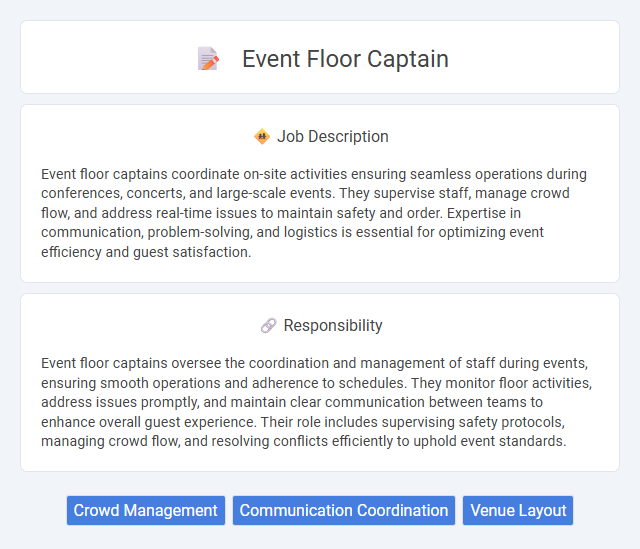
Event floor captains coordinate on-site activities ensuring seamless operations during conferences, concerts, and large-scale events. They supervise staff, manage crowd flow, and address real-time issues to maintain safety and order. Expertise in communication, problem-solving, and logistics is essential for optimizing event efficiency and guest satisfaction.
People with strong communication skills and the ability to remain calm under pressure are likely suitable for the Event Floor Captain role, as it involves coordinating staff and managing crowd flow efficiently. Candidates who thrive in fast-paced, dynamic environments and have a natural aptitude for leadership may also find this job fitting. Those who struggle with multitasking or high-stress situations might not be the best fit for these responsibilities.
Qualification
Event floor captains must possess strong leadership skills and extensive experience in event management to coordinate staff efficiently and ensure smooth operations. Proficiency in communication, problem-solving, and crowd control techniques is essential for managing large groups and addressing issues promptly. Certifications in first aid and safety protocols are highly preferred to maintain a secure and safe environment during events.
Responsibility
Event floor captains oversee the coordination and management of staff during events, ensuring smooth operations and adherence to schedules. They monitor floor activities, address issues promptly, and maintain clear communication between teams to enhance overall guest experience. Their role includes supervising safety protocols, managing crowd flow, and resolving conflicts efficiently to uphold event standards.
Benefit
Event floor captain roles likely provide significant benefits including enhanced leadership experience and strong organizational skills development. There is a high probability that individuals in this position gain valuable networking opportunities by interacting with key event stakeholders and team members. The role may also offer increased job visibility, which can improve chances for career advancement within the event management industry.
Challenge
Event floor captain roles likely involve managing large crowds and coordinating diverse teams under high-pressure situations, which presents significant challenges. These challenges usually require quick decision-making skills and effective communication to ensure event operations run smoothly. The probability is high that the floor captain must adapt swiftly to unexpected issues while maintaining control and safety on the event floor.
Career Advancement
Event floor captains oversee event operations, ensuring seamless coordination between staff and vendors to enhance attendee experience. Mastery in communication, problem-solving, and leadership often leads to promotion opportunities such as event manager or operations director roles. Increased responsibility in managing larger events and teams accelerates career growth within the event management industry.
Key Terms
Crowd Management
An Event Floor Captain plays a critical role in crowd management by coordinating staff and ensuring smooth crowd flow to maintain safety. They implement crowd control strategies, monitor attendee movement, and promptly address any congestion or emergency situations. Effective communication and situational awareness are essential for minimizing risks and enhancing overall event experience.
Communication Coordination
Event floor captains excel in communication coordination by efficiently directing team members and vendors to ensure seamless event execution. They utilize clear, concise instructions and real-time updates to manage crowd flow, resolve issues promptly, and maintain safety standards. Proficient in interpersonal skills, they bridge gaps between event staff, clients, and management to uphold operational excellence.
Venue Layout
An Event Floor Captain expertly manages the venue layout to ensure seamless crowd flow and optimal space utilization during events. They coordinate placement of equipment, signage, and seating arrangements based on detailed floor plans and safety regulations. Their role is critical in maintaining efficient movement paths and emergency access points within complex event spaces.
 kuljobs.com
kuljobs.com